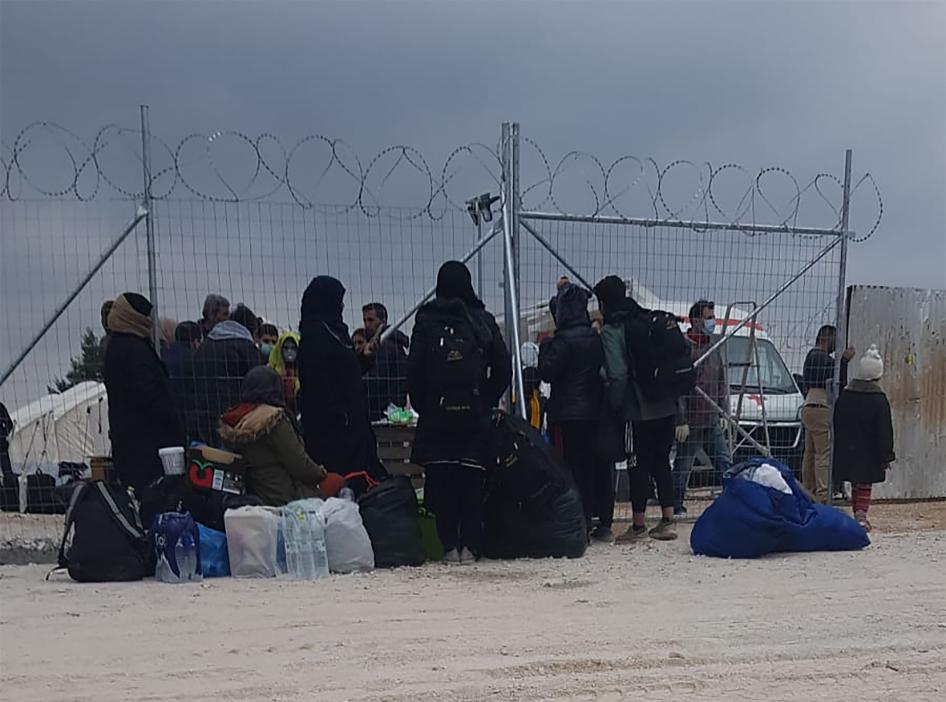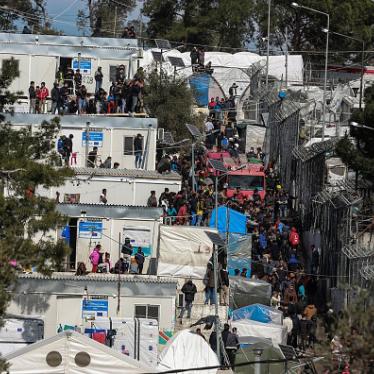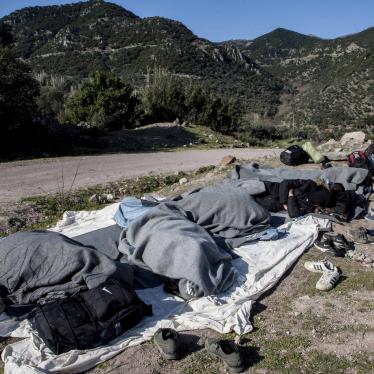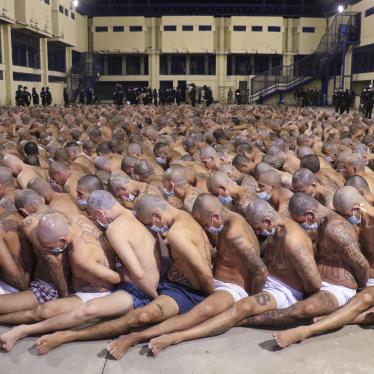(Athens) – Greek authorities are arbitrarily detaining nearly 2,000 migrants and asylum seekers in unacceptable conditions, and denying them the right to lodge asylum claims, in two recently established detention sites on mainland Greece, Human Rights Watch said today. Authorities claim they are holding the new arrivals, including children, persons with disabilities, older people, and pregnant women, in quarantine due to COVID-19, but the absence of even basic health precautions is likely to help the virus spread.
“If the government is serious about preventing COVID-19 transmission and illness among migrants and asylum seekers, it needs to scale up testing, provide more tents, and give people enough toilets, water, and soap, and put in place prevention interventions,” said Belkis Wille, senior Crisis and Conflict researcher at Human Rights Watch. “Forcing people, some of whom are at high risk of severe disease or death, to live in dirty and unsanitary conditions, cramped together in close quarters, is a recipe for spreading the virus, not to mention is degrading and inhumane.”
Governments can lawfully impose a quarantine to separate people who may have been exposed to or are showing symptoms of an infectious disease. A lawful quarantine should be necessary and fit to serve the purpose of protecting public health. It should be imposed in a non-arbitrary and nondiscriminatory manner.
Greece, however, is detaining migrants because of their immigration status and not providing them with appropriate health protections as expressed in the International Health Regulations or current World Health Organization guidance.
Women, men, and children are being detained in unsanitary and cramped conditions, regardless of whether the country they have arrived from is considered high COVID-19 risk, with no indication that they will be released if found to be virus-free. The authorities do not appear to have tested the detainees for the virus, besides taking their temperature upon arrival. Nor will they be released after the 14-day WHO-recommended isolation period.
Instead, they face continued immigration detention, even though Greece most likely cannot readmit them to Turkey as a transit country or return them to their countries of origin in the foreseeable future. In such circumstances, there is no legal justification for their prolonged detention.
On March 25 and 26, Human Rights Watch remotely interviewed four men who said they had been held in the Malakassa detention site since March 14. Each of them said the roughly 450 detainees with them had severely limited access to water, electricity, hygiene products, clothing, and blankets. They said that detainees were sleeping in cramped tents with up to ten people, often from different families. Two of the men, who had young children, said they didn’t have enough milk and diapers for their kids. They said the authorities had not taken any measures to prevent the spread of COVID-19. The four men and a lawyer at the Legal Centre Lesvos all said that the police guarding the sites were not allowing anyone inside to leave, except for medical emergencies.
On March 26, the Greek parliament ratified a March 1, 2020 government decree suspending access to asylum for 30 days for people who irregularly entered the country. The March 1 decision, taken before any measures to address the COVID-19 outbreak in Greece, calls for new arrivals to be immediately deported “where possible, to their countries of origin” or transit countries, such as Turkey, without registering them. Greece’s decree made no reference to preventing coronavirus infection but rather was a reaction to Turkey’s announcement that it would open its EU borders to migrants and asylum seekers who wanted to leave.
Since then, however, no deportations have occurred because Turkey has refused to accept any deportees from Greece. Instead, following the decision, Greek authorities rounded up at least 1,974 people who arrived in Greece as of March 1, and transferred them to two recently established detention sites outside of the town of Serres, 350 kilometers north of Athens, and on a plot of military-owned land outside the town of Malakassa, 20 kilometers north of Athens. Other new arrivals continue to be detained in ports and at arrival sites.
On March 14, a Greek naval vessel transferred 436 migrants, including women, men, and children, to the detention site in Malakassa. The government has continued to transfer groups of new arrivals there, according to people being held inside. On March 20, authorities transferred at least another 603 people by vessel from Lesbos and other Greek islands to the detention site in Serres. According to aid workers monitoring the transfers and the people inside, police are guarding both sites. On March 17, the government justified the transfers by stating it was part of its response to the COVID-19 virus.
The lawyer at the Legal Centre Lesvos who has been in contact with some of the people since their arrival in Lesbos and Chios, and their transfer to Malakassa and Serres, said the police gave the people she spoke to a 3-day detention order in early March, pending deportation. Right before transporting them from Lesbos to the mainland on March 14, police gave them a deportation order for their “immediate readmission to Turkey.” Human Rights Watch reviewed copies of both documents.
According to the lawyer, the Greek government has openly said that it wishes to deport these individuals without giving them an opportunity to lodge their asylum claims. It is unclear what the government will do after the 30-day suspension period ends. The asylum service is closed until at least April 10 due to COVID-19, so will likely not provide further information in the near future.
The Unions of Police Personnel of Athens, North-East Attica, and Western Attica said in a March 26 statement that hygiene measures in Malakassa were “non-existent,” adding that in the face of COVID-19, the situation was “mathematically evolving into a slow fire bomb as basic sanitary protections are lacking (toilets, cleanliness, masks, gloves, number of people residing in tents, etc.).”
Human Rights Watch tried to reach three people who were reportedly being held in Serres, but the facility has no electricity and their phones were switched off. Researchers interviewed a man detained in Malakassa who said he had spoken with a friend upon her arrival in Serres, and another lawyer who had spoken with three others upon their arrival at Serres. According to this man and the lawyer, the conditions in the facility were as crowded and unsanitary as the conditions in Malakassa.
Similarly, the Union of Police Personnel of Serres stated on March 23 that the detention site was “completely inappropriate” and would “create conditions of suffocation for the inhabitants there.” Detainees were housed 10 to a tent that had the capacity for five, the union said, adding that they did not think the tents could withstand extreme weather. The weather in Serres is currently cold, with temperatures dropping to 4 degrees Celsius at night.
Greece should not extend its March 1 decision to suspend access to asylum for 30 days for people who irregularly entered the country, Human Rights Watch said. It should ensure that all measures it undertakes to combat COVID-19 are applied in a nondiscriminatory manner.
EU member states have deployed their national border guards through Frontex to work within the operational command of Greek border-control authorities and are engaged in apprehending would-be asylum seekers. EU member states should suspend any participation in Frontex operations that fail to adhere to binding international human rights standards.
The European Commission should urge Greece to reinstate asylum procedures for people irregularly entering Greece in line with EU and international law and press the Greek authorities to ensure that new arrivals are not detained arbitrarily. It should tie its support for border management to Greece to its commitment to guarantee the right to seek asylum.
The European Commission should specifically monitor the situation faced by asylum seekers in the Malakassa and Serres facilities and raise with the Greek authorities concerns on the denial of access to asylum, inadequate conditions, lack of access to legal support, and the risks that those people face arbitrary detention and refoulement. It should also open legal proceedings against Greece if the authorities fail to effectively resume access to asylum and fail to meet binding EU standards on reception conditions for people seeking international protection.
Migrant women, men, and children should be housed in facilities with adequate security, sanitation, and hygienic conditions and should be allowed to apply for asylum. Any healthcare needs should be promptly addressed.
“International human rights bodies and health experts have been calling globally for authorities to reduce the number of people in detention to limit the spread of the virus,” Wille said. “Inexplicably, Greece seems to be doing the opposite and putting people at grave risk.”
Detention Conditions in Malakassa
Three men from Syria and one from Iraq that Human Rights Watch interviewed by telephone said police were detaining them in the Malakassa closed camp, which was divided into three sections. They were all being held in the same section and said police were detaining 450 people there, including unrelated women, men, and children in the same tents, and were holding another 921 people in the other two sections as of March 26, based on food distribution lists that they saw. One man who was in touch with someone in the other sections said the people there arrived after their section had been transferred from Rhodes, Kos, Symi, and Kastelorizo.
All four men said that when they arrived in Malakassa, their temperature was taken, but they did not have any further medical checkups. They added that for the first four days they were there, authorities did not provide them with any hygiene products but that, after people protested, police gave them one to two soap bars and one to two shampoo bottles for each tent, which houses between eight and ten people. The men said those supplies have been used but the authorities have not provided any more. The detainees do not have access to hand sanitizer, or other forms of hygiene protection.
The interviewees said that their section of the camp has 20 showers and 30 toilets, which do not flush. The group of toilets only have about 20 rolls of toilet paper per day that run out quickly. The water, sanitation, and hygiene facilities are not in line with the United Nations guidelines to prevent gender-based violence in displacement settings, which call for hygienic, gender-separated toilets and bathing facilities with working locks, adequate lighting, and privacy. The interviewees said they got their drinking water from sinks next to the showers, but that water generally ran out after an hour of use and would only return after four to five hours.
They described their tents as about five by five meters and said authorities gave each person one blanket and a thin mat. The men said that the blankets were not enough given the low temperature. The weather in Malakassa is currently cold, with temperatures dropping to 8 degrees Celsius at night. The men all said they had begged the police for clothes because most families have only the clothes they had arrived in Greece in. One added that some families had to use the blankets they were given to make clothing and he shared a photograph of a toddler in a pair of trousers made from a blanket. They said authorities refused to give them more blankets.
“We know there are some older people in the group who are at least 65, who are already frail from the perilous journey, sleeping outside, and the stress of being detained and transferred to different locations. Holding them in these conditions, in the same clothing and underwear they have been in for almost a month now only makes it more likely they might get sick,” the lawyer from Legal Centre Lesvos said.
Older people tend to have less body fat, less efficient circulation, and a slower metabolism. For older people hypothermia can set in around 17 degrees Celsius. COVID-19 disproportionately affects older people and individuals with underlying health conditions. Older people and people with reduced mobility specifically need access to additional blankets and heating.
Another man said that a friend of his, living in Greece, came to the camp with clothing for his family but the police refused to allow the friend to hand him the items or approach the detention site fence. The third man said, “We are washing our babies’ clothing and putting it back onto them when it is still wet because we have no change of clothes for them.”
The interviewees said there is no electricity in the tents in Malakassa, only a set of sockets near the showers for people to charge their phones. All four men said they were running out of internet credit and that the police were not allowing their friends outside the camp to come to the camp to provide them more.
The four men in Malakassa said there is a general practitioner sitting in an ambulance outside the detention site for several hours a day providing basic medical care. In some cases, pregnant women have not been able to access appropriate prenatal care or care during labor and delivery. One of the men, the husband of a pregnant woman in Malakassa, told Human Rights Watch that she suffered considerable abdominal pain over the last month and that after arriving in Malakassa, the general practitioner agreed to approve a visit for her to a local health center. Authorities at first refused to let her husband join her, he said, but finally agreed after making the couple wait all night and forcing him to be transported to and from the hospital in handcuffs under police escort. The doctors at the hospital only spoke Greek. The man explained, and he said:
We still have no idea what her condition is or what the medicine was that they gave her. They gave us some papers that the police confiscated when we got back. I am begging them every day to give them back, so I can send a photo to a friend who could translate for us. They keep refusing though, and I have no idea why.
On the evening of March 25, according to the men in Malakassa, another pregnant woman inside the site went into labor but police refused to call an ambulance to take her to the hospital for two and a half hours, only calling for one after her water broke and people were banging on the fence to alert the police. One man shared three videos with Human Rights Watch of the scenes, in which you can see the police on the other side of the fence watching the woman in labor but apparently taking no action.
International standards on detention of asylum seekers, migrants, and refugees state: “As a general rule, pregnant women and nursing mothers, who both have special needs, should not be detained,” and alternative measures should be sought. International guidelines on detention of women also call for “gender-specific health care,” and for providing pregnant and lactating women with appropriate health and dietary support. Emergency obstetric and newborn care should be accessible in humanitarian crises, in line with international standards.
The lawyer said she knew of at least five unaccompanied children held in Malakassa, all of whom were sleeping in tents with other families, not in separate facilities. As far as she was aware, there were no special services for them.
One of the interviewed men said that he had seen at least four people in Malakassa with physical disabilities said there were no accessible hygiene facilities available for them.
The four men in Malakassa said that while authorities were giving them enough food, they were providing the same meals to everyone, without any special provisions beyond one bottle of 250ml bottle of milk per day for babies, which one man, a father of two toddlers, said was not sufficient. Authorities were giving those with babies four diapers a day which was not enough, he said.
International Law Obligations
Greece has the right to control its borders and manage crossings into the country but is bound by the EU Charter of Fundamental Rights which guarantees the right to seek asylum. Denying people access to asylum is illegal under EU law. It may also violate the fundamental principle of nonrefoulement, the prohibition on returning refugees or asylum seekers to a country where they are liable to face persecution or serious violations of their rights.
Arbitrary detention is prohibited under international and European human rights law as well in Greek law. While irregular migrants may be detained for limited periods of time pending lawful removal, decisions on removal have to be made following individualized determinations, and not blanket application of policy. On March 13, EU Commissioner for Home Affairs, Ylva Johansson, said that people who arrived in Greece in March should have the right to apply for asylum, should not be returned without an individual decision, and that Greece should respect the principle of nonrefoulement.
Immigration detention is a non-punitive, administrative deprivation of liberty that is only lawful if it is necessary and proportionate to carry out a legitimate aim. Those in immigration detention awaiting deportation can only be held if the deportation can be executed within a reasonable time, otherwise the legitimacy of their detention evaporates.
As travel bans due to COVID-19 increasingly prevent forced returns and courts limit their activities, the reason that thousands of people across the EU and other European states may be held in detention – to execute a deportation order – is no longer justified. The EU Returns Directive allows detention pending deportation for up to 18 months, but stipulates that if “a reasonable prospect of removal no longer exists … detention ceases to be justified and the person concerned shall be released immediately.”
Under international human rights law, everyone, including people in custody, has the right to “the highest attainable standard of physical and mental health.” States have an obligation to ensure that medical care for those in their custody is at least equivalent to that available to the general population and must not limit equal access to preventive, curative, or palliative care. Measures to prevent the spread of diseases in confinement should be based on the best science available and be proportionate and limited in scope and duration, with every effort made to safeguard mental well-being of detainees.
In the context of the COVID-19 pandemic, international human rights law requires that restrictions on rights for reasons of public health or national emergency be lawful, necessary, and proportionate as well as nondiscriminatory.
In a statement of principles on the treatment of prisoners and detainees amid the COVID-19 crisis, the European Committee for the Prevention of Torture, a body of the Council of Europe, asked authorities to use alternatives to detention “and refrain, to the maximum extent possible, from detaining migrants.” On March 25, its sister body, the UN Subcommittee on the Prevention of Torture urged all states to reduce populations in detention centers and refugee camps “to the lowest possible level.” The same day, UN High Commissioner for Human Rights Michelle Bachelet said governments should “work quickly to reduce the number of people in detention” to mitigate the risk of COVID-19 “rampaging through such … extremely vulnerable populations.” On March 26, Council of Europe Commissioner for Human Rights Dunja Mijatović echoed the call to release detainees from immigration detention to the extent possible.













